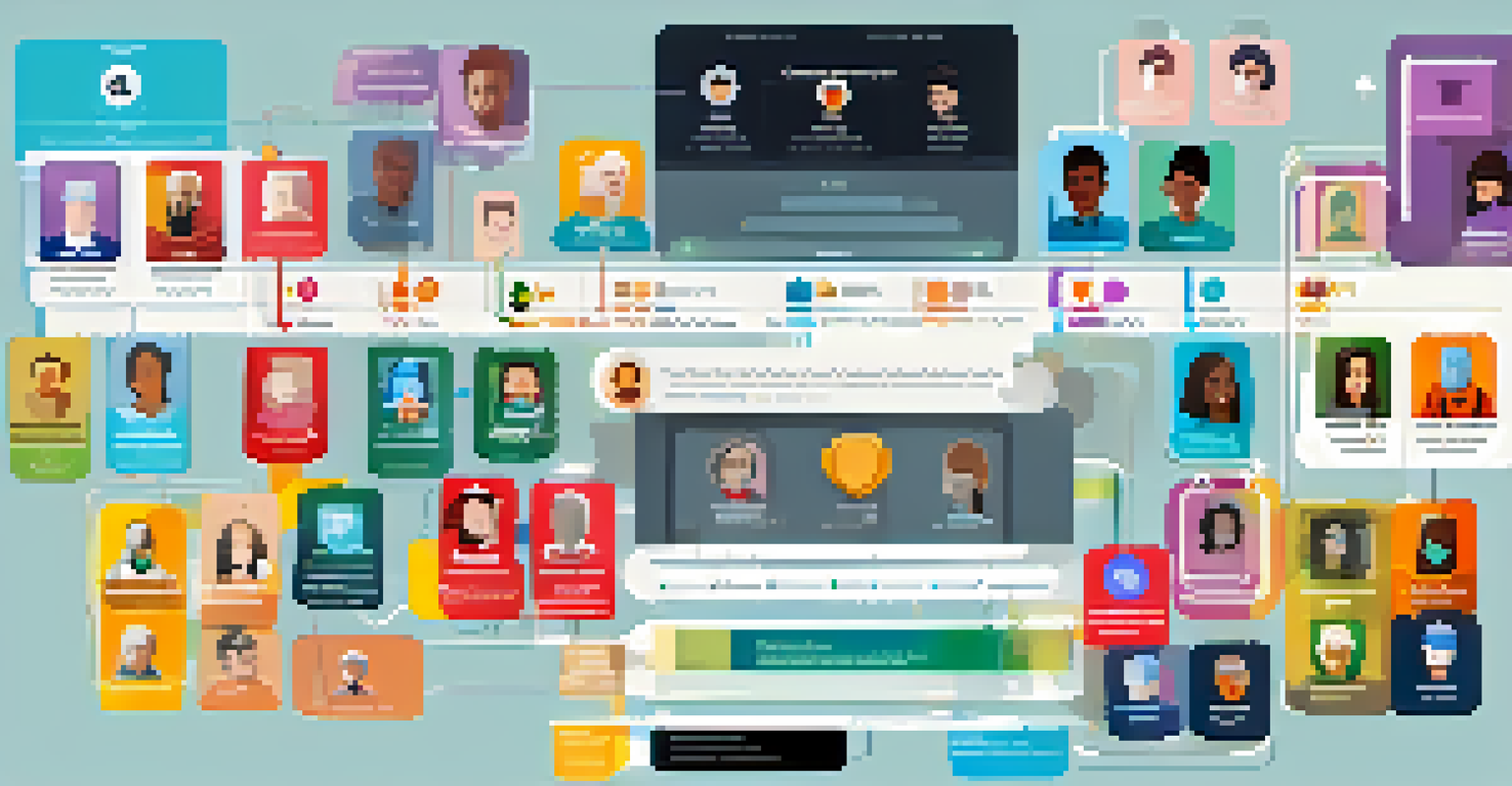Ensuring User Accountability with Decentralized Reputation

Understanding Decentralized Reputation Systems
Decentralized reputation systems are innovative frameworks that assess and showcase user trustworthiness without relying on a central authority. Unlike traditional systems, where a single entity manages reputation, decentralized models empower users to contribute and validate each other's credibility. This shift not only democratizes reputation management but also enhances transparency, making it harder for bad actors to manipulate the system.
The best way to predict the future is to create it.
For example, think of a community garden where everyone can see each other's contributions and behaviors. If someone consistently helps, their reputation naturally grows, while those who neglect their duties fade into the background. This visibility fosters accountability, encouraging users to act responsibly, knowing their actions are observable by peers.
In essence, decentralized reputation systems leverage blockchain technology and peer-to-peer interactions to create a more reliable and inclusive way to evaluate trust. As we move forward in a digital world, these systems could become integral to various sectors, from online marketplaces to social networks.
The Importance of User Accountability
User accountability is crucial in fostering a healthy online environment. When individuals are held responsible for their actions, it cultivates trust within a community, leading to enhanced collaboration and interaction. In decentralized settings, accountability ensures that everyone plays by the same rules, and those who violate them face the consequences.

Consider an online review platform where users leave feedback about products or services. If users aren't held accountable for their reviews, false information could proliferate, leading to poor decisions by others. However, with a decentralized reputation system, each user's history and reliability are visible, encouraging them to provide honest, constructive feedback.
Decentralization Boosts Trust
By distributing power among users, decentralized reputation systems foster a trusting environment through collective validation.
Ultimately, fostering user accountability not only protects individual interests but also strengthens the community as a whole. With a system in place that promotes honest interactions, users are more likely to engage positively, knowing they are part of a trustworthy network.
How Decentralization Enhances Trust
Decentralization inherently boosts trust by removing the reliance on a single authority. In traditional systems, users often question the impartiality of the governing body, which can lead to skepticism and disengagement. By distributing the power among participants, decentralized reputation systems create an environment where trust is built through collective validation.
Trust is the foundation of any relationship, and without it, the relationship will crumble.
Imagine a neighborhood watch where every resident plays a role in monitoring safety. When everyone contributes, the collective effort promotes a sense of security and trust among neighbors. Similarly, decentralized systems allow users to authenticate each other’s actions, leading to a more robust and trustworthy community.
Moreover, the transparency afforded by blockchain technology ensures that reputation data is immutable and verifiable. This transparency minimizes manipulation and fosters an environment where users are more likely to trust the information they encounter.
Mitigating Fraud with Decentralized Reputation
Fraudulent activities can undermine the integrity of online platforms. However, decentralized reputation systems take significant strides in mitigating such risks by holding users accountable for their actions. When users know that their reputations are at stake, they are less likely to engage in dishonest behavior or scams.
For instance, in peer-to-peer lending platforms, borrowers and lenders both have reputations that influence their interactions. If a borrower defaults and has a poor reputation, future lenders will be cautious, while reliable borrowers benefit from better terms. This dynamic creates a self-regulating environment where fraud is less likely to thrive.
Accountability Mitigates Fraud
Decentralized systems hold users responsible for their actions, significantly reducing the likelihood of fraudulent behavior.
By leveraging the community's collective oversight, decentralized reputation systems can effectively deter fraudulent activities, making online interactions safer for everyone involved.
Challenges in Implementing Decentralized Reputation
While decentralized reputation systems offer numerous benefits, they also face unique challenges in implementation. One significant hurdle is ensuring user privacy while maintaining transparency. Striking the right balance is crucial; users must feel secure sharing information without fearing misuse or exposure.
Another challenge is the potential for malicious users to game the system. For example, individuals could create multiple identities to inflate their reputation or discredit others. To counteract this, systems need robust mechanisms to detect and prevent such behaviors, ensuring that reputation remains trustworthy.
Lastly, user adoption can be a barrier. Many may be unfamiliar with decentralized technologies, leading to resistance or skepticism. Educating users about the benefits and functionalities of these systems is essential for widespread acceptance and success.
The Role of Community in Reputation Systems
Community plays a vital role in the effectiveness of decentralized reputation systems. A strong community encourages active participation, which is essential for the validation and maintenance of reputation data. The more engaged the community, the more reliable the information becomes, creating a positive feedback loop of trust and accountability.
For instance, in a decentralized social media platform, active users who contribute meaningful content can earn higher reputations, which in turn incentivizes others to participate positively. This communal effort not only enhances individual experiences but also strengthens the overall platform.
Community Engagement is Key
A strong, engaged community enhances the reliability of reputation data, creating a positive cycle of trust and accountability.
Additionally, fostering a sense of belonging within the community can further motivate users to uphold accountability. When individuals feel connected and responsible for one another, they are more likely to act in the best interests of the group.
Future Trends in Decentralized Reputation Systems
As technology continues to evolve, so too will decentralized reputation systems. One emerging trend is the integration of artificial intelligence to enhance the evaluation process. AI can analyze vast amounts of data to identify patterns and determine trustworthiness more efficiently, allowing for quicker and more accurate assessments.
Another trend is the growing use of decentralized finance (DeFi) in reputation systems, where users can stake tokens to back their reputations. This mechanism not only incentivizes honest behavior but also adds a layer of financial accountability, as bad actions could result in financial loss.

Moreover, as more businesses recognize the importance of digital trust, we can expect to see increased adoption of these systems across various industries. From e-commerce to social networking, decentralized reputation systems will likely become a cornerstone of user interactions, shaping the way we engage in the digital world.